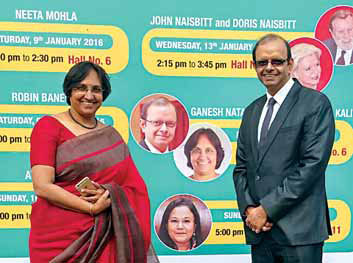
If India has to take its rightful place as a leaders of the free and democratic world, it needs all of us to encourage our youth to unknot their tongues, free their minds and communicate often and well
In the next financial year, Zensar Technologies will have a new CEO who will have the privilege of leading a company which has broken all records in the past five years with an annual value growth of 44 percent compared to the BSE Sensex which reported a CAGR for the same period of 10 percent. In our exciting industry, leading a company which has been built and sustained on the triple bottom line and paid equal attention to the three Ps of Profit People and Planet will surely be a treat for my successor Sandeep Kishore and eight thousand plus Zensarians and many more shareholders will wish him well in his quest to take this company to the next level of global success.
In a conversation with Sandeep recently I was delighted to find that apart from his many virtues including spending 28 years in HCL, his interests like many of us in Zensar go beyond just revenue and profits and extends to literary pursuits. His book of Hindi poems has been published and he retains a keen interest in the finer aspects of life. The value of keeping this balance was also brought out in an interesting conversation at the World Book Fair in Delhi that Kiran Karnik, former President of NASSCOM had with Prameela and I, co-authors of the Sage Publication on Zensar titled ‘From Start-Up to Global Success’.
Commenting on the fact that the largest chapter of the book (thirty-eight pages) was focused on the company’s contributions to the social sector, our discussion touched on the need for companies to create local and national value for the community and the employees of a company beyond just shareholder value.
Indeed, as one celebrity Fortune Fifty CEO once said “The narrow pursuit of shareholder value is the dumbest idea in the world.” Most institution builders in the corporate sector truly believe that this is the mantra of success for most long term success stories, individuals as well as companies!
So where does the virtue of articulation figure in this need to en-large the corporate agenda beyond the simple pursuit of profit? Quite simple because when one wants to get more out of life than just do one’s job and go home peacefully every day, there is an agenda that needs to be created and communicated to a vast cross-section of stakeholders. Whenever I move in one week from leading a meeting with a Zensar customer to speaking at a CII or NASSCOM National Council meeting to interact with the community school children in Johannesburg, Hyderabad to Pune, I say a silent vote of thanks to my father the late Shri Ganpathy Iyer Natarajan, whose work with the Ramakrishna Mission and the Tamil Sangam was a constant inspiration of my childhood in Ranchi and to my school Vice Principal in Bishop Westcott Ranchi Algernon Fitzgerald who exhorted me to focus on English elocution and debates to master articulation. Their encouragement truly set me off on a path which has seen me undertake multiple initiatives and enjoy each one of them.
The young Indian has to be cajoled into asking questions whereas in most Western audiences, hands shoot up when the opportunity to make a comment or ask a question appears
A salute too to three great friends in Pune – Lavanya Jayaram CMO of Zensar, Shaonlee Bose start-up entrepreneur and Ruchi Mathur Head of Zensar Foundation and CEO of Pune City Connect who share my passion – for prose poetry and just the simple joys of the English turn of phrase. These three young women truly represent the confluence of excellence that so typifies the city of Pune. Shaonlee and Lavanya came to the city from Kolkata and Hyderabad respectively to study mass communications and practise the art in corporate and entrepreneurial pursuits while Ruchi, an alumnus of India’s top business school, IIM Ahmedabad, has a mission, in her words to “facilitate change at a system level; cutting across conventional boundaries such as specific organisations.” Their ability to communicate, connect and motivate everybody whose life is touched by theirs, and their influence on their teams and the community is their ability to think clearly articulate well and follow through to ensure that the goals they set for themselves and their projects and programmes are achieved.
The young Indian has to be cajoled into asking questions whereas in most Western audiences, hands shoot up when the opportunity to make a comment or ask a question appears. Having wondered whether this is just not having anything to say or the diffidence that comes from a lack of confidence in articulating in English, my research and interactions with young people – in Zensar, the industry and academic institutions everywhere points to the latter. If India has to take its rightful place as a leader of the free and democratic world, it needs all of us to encourage our youth to unknot their tongues, free their minds and communicate often and well. Maybe not everyone aspires to be or can be a Sandeep or Prameela or Lavanya or Shaonlee or Ruchi, but surely we owe it to them to give them the confidence to try!
BY Ganesh Natarajan